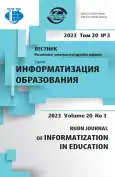Digital economy competencies: experience and stages of formation among university students
- 作者: Drobysheva I.V.1, Drobyshev Y.A.1
-
隶属关系:
- Kaluga Branch of Financial University under the Government of the Russian Federation
- 期: 卷 20, 编号 3 (2023)
- 页面: 241-254
- 栏目: INFORMATIZATION OF EDUCATION: A GLOBAL PERSPECTIVE
- URL: https://journal-vniispk.ru/2312-8631/article/view/321261
- DOI: https://doi.org/10.22363/2312-8631-2023-20-3-241-254
- EDN: https://elibrary.ru/EMYPKJ
- ID: 321261
如何引用文章
全文:
详细
Problem statement. In accordance with the goals and indicators of federal projects, the leading role in the formation of key competencies of the digital economy is assigned to institutions of secondary general, vocational and additional education. To form digital competencies in the field of creating algorithms and computer programs, digital departments have been created in a number of universities in the country. Based on this, the problem of the formation of these competencies among students studying in various fields of training, in the absence of a digital department at the university, becomes urgent. The purposes of the study are to analyze the existing experience of students' formation of competencies necessary for the implementation of the national program “Digital economy of the Russian Federation” and formulate proposals for improving this process. Methodology. A set of measures was carried out, including the analysis of educational training programs in order to identify disciplines, the study of which provides students with the knowledge and skills to develop algorithms, create computer programs, theoretical analysis of research in this area and the development of a methodological approach that ensures the formation of digital competencies in the field of creating algorithms and computer programs. Results. The analysis of the process of formation of digital competencies among university students, the theoretical analysis of research on this problem made it possible to identify and disclose the stages of formation of digital competencies in the field of algorithms and computer programs development. Conclusion. The result of the analysis of educational programs of universities was the conclusion about their insufficient focus on the formation of digital competencies of students. Based on the theoretical analysis of research in the field of the formation of competencies for the creation of algorithms and computer programs and their own experience, an approach to the formation of students of this competence is proposed.
作者简介
Irina Drobysheva
Kaluga Branch of Financial University under the Government of the Russian Federation
Email: ivdrobysheva@fa.ru
ORCID iD: 0000-0002-4260-8634
Doctor of Pedagogical Sciences, Professor, Head of the Department of Business Informatics and Higher Mathematics
17 Chizhevskogo St, Kaluga, 248016, Russian FederationYuri Drobyshev
Kaluga Branch of Financial University under the Government of the Russian Federation
编辑信件的主要联系方式.
Email: drobyshev.yury2011@yandex.ru
ORCID iD: 0000-0003-1317-7182
Doctor of Pedagogical Sciences, Professor of the Department of Business Informatics and Higher Mathematics
17 Chizhevskogo St, Kaluga, 248016, Russian Federation参考
- Kuznetsov VV. State program “Digital Economy of the Russian Federation”: analysis of the readiness of regions. Regional Economics and Management. 2019;(1):5709. (In Russ.) Available from: http://https://eee-region.ru/article/5709/ (accessed: 23.03.2023).
- Kulagina NA, Lysenko AN, Novikov SP. Training of personnel for the digital economy: trends and problems. Bulletin of PNRPU. Socio-Economic Sciences. 2022;(3):148‒160. (In Russ.)
- Gileva TA. Digital economy competencies and skills: staff development program design. Вulletin USPTU. Science, Еducation, Еconomy. Series Еconomy. 2019;(2):22‒35. (In Russ.)
- Levitsky ML, Grinshkun VV, Zaslavskaya OYu. Trends and features of the informatization of higher education modern stage. RUDN Journal of Informatization in Education. 2022;19(4):285–299. (In Russ.) http://doi.org/10.22363/2312-8631-2022-19-4-285-299
- Bazhenova IV. Methods of projective-recursive programming training for students of mathematical fields of training (abstract of the dissertation for the degree of Candidate of Pedagogical Sciences). Krasnoyarsk; 2015. (In Russ.)
- Kasyanova EV. Methods and means of teaching programming at the university. Educational Resources and Technologies. 2016;(2):23‒30. (In Russ.)
- Kalitina VV. Formation of software and algorithmic competence of bachelors of information directions in teaching programming (abstract of the dissertation for the degree of Candidate of Pedagogical Sciences). Krasnoyarsk; 2015. (In Russ.)
- Popova VV. Formation of algorithmic competence of students – future ICT specialists in the system of secondary vocational education in the process of teaching mathematics (dissertation for the degree of Candidate of Pedagogical Sciences). Krasnoyarsk; 2019. (In Russ.)
- Konnova LP, Stepanyan IK. Formation of digital skills in the first year of the Bachelor of Economics. Modern Science: Actual Problems of Theory and Practice. Series: Humanities. 2020;(5):84‒89. (In Russ.)
- Аndreeva AA, Pavlov LA, Shchiptsova AV. Continuous formation of programming competencies among students in the bachelor's degree program “Computer science and computing technology”. Bulletin of the Chuvash State Pedagogical University named after I.Ya. Yakovleva. 2019;(5):108‒115. (In Russ.)
- Barysheva IV, Malkina EV, Kozlov OA. Project method of teaching program- ming to students of specialized specialties in the conditions of distance work. Questions of Teaching Methods at the University. 2021;10(38):40‒55. (In Russ.) https://doi.org/10.18720/HUM/ISSN2227-8591.38.04
- Slinkin DA. The use of the project method in teaching programming in the course of computer science (dissertation for the degree of Candidate of Pedagogical Sciences). Yekaterinburg; 2001. (In Russ.)
- Pavlenko EN, Usinskaya TS, Chistyakova RN. The experience of using the project method in the study of the topic “Algorithmization and programming” in the context of the implementation of the Federal State Educational Standard. Informatics at School. 2019;(2):18‒25. (In Russ.) https://doi.org/10.32517/2221-1993-2019-18-2-18-25
- Shtanyuk AA. The experience of using the project approach in teaching programming. Innovative Technologies in Educational Activities: Materials of the All-Russian Scientific and Methodological Conference. Nizhny Novgorod; 2018. p. 242‒244. (In Russ.)
- Dmitriev YaV, Balyabin IA, Brovko EI, Dvinina SYu, Demyanova OV. Development of digital skills among university students: de jure vs de facto. University Management: Practice and Analysis. 2021;25(2):59‒79. (In Russ.)
补充文件









